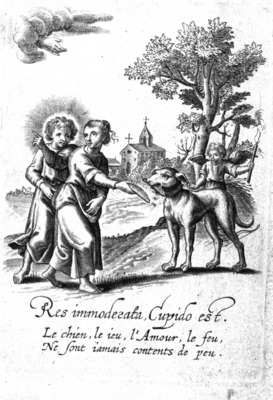Ludovicus van Leuven, Amoris divini et humani antipathia (1629)
Table of contents ↑Cupiditas Amoris [15]

XV.
August.
Ambros.
Senec.
SVperbia & Cupiditas in tantum vnum malum
sunt, vt nec superbia sine cupïditate, nec cupi-
ditas sine superbia inuenire possit.
Cupiditas est effrænatus, immoderatusque ap-
petitus non rarò amatorum mundi corda affi-
ciens. sicut enim qui per insaniam mente translati
sunt, non res ipsas, sed passionis suæ phantasias vi-
dent, ita etiam horum mens semel vinculis cupi-
ditatis adstricta semper aurum, semper argentum
credit videre, semper reditus computat. aurum
gratius quam solem intuetur: ipsa eius oratio &
supplicatio ad Dominum, aurum quærit.
Vides canem, missa frusta panis, aperto ore ca-
ptantem; quidquid accipit, protinus integrum de-
uorat, & semper ad spem futuri hiat. idem euenit
Amatoribus mundi; quidquid exspectantibus for-
tuna proiecit, id sine vlla voluptate dimittunt, sta-
tim ad rapinam alterius erecti & attoniti in Epi-
cureum illud chaos incidunt, inane sine termino
est.
SVperbia & Cupiditas in tantum vnum malum
sunt, vt nec superbia sine cupïditate, nec cupi-
ditas sine superbia inuenire possit.
Cupiditas est effrænatus, immoderatusque ap-
petitus non rarò amatorum mundi corda affi-
ciens. sicut enim qui per insaniam mente translati
sunt, non res ipsas, sed passionis suæ phantasias vi-
dent, ita etiam horum mens semel vinculis cupi-
ditatis adstricta semper aurum, semper argentum
credit videre, semper reditus computat. aurum
gratius quam solem intuetur: ipsa eius oratio &
supplicatio ad Dominum, aurum quærit.
Vides canem, missa frusta panis, aperto ore ca-
ptantem; quidquid accipit, protinus integrum de-
uorat, & semper ad spem futuri hiat. idem euenit
Amatoribus mundi; quidquid exspectantibus for-
tuna proiecit, id sine vlla voluptate dimittunt, sta-
tim ad rapinam alterius erecti & attoniti in Epi-
cureum illud chaos incidunt, inane sine termino
est.

Cat.
Et vorat & protinus ruit in noua frustra molossus,
Quodque petat cupidus semperAmator habet.
Heu! numquam præsens homini fert hora quietem,
Nec satis id, quod adest, pectora nostra iuuat.
Cum desiderio semper gemit ægra futuri,
Atque aliud nobis, mens, aliudque petit.
Et vorat & protinus ruit in noua frustra molossus,
Quodque petat cupidus semperAmator habet.
Heu! numquam præsens homini fert hora quietem,
Nec satis id, quod adest, pectora nostra iuuat.
Cum desiderio semper gemit ægra futuri,
Atque aliud nobis, mens, aliudque petit.

Conuoitise de l'Amour.
XV.
Qui veut nourir l'Amour à poids & à mesure,
Ne cognoit son humeur, & change la nature
D'vn feu perpetuel, d'vn appetit sans fin.
Amour, n'est pas Amour, s'il n'est insatiable,
L'assez est criminel, en l'ardeur veritable
Tant de l'Amour humain, que de l'Amour diuin.
XV.
Qui veut nourir l'Amour à poids & à mesure,
Ne cognoit son humeur, & change la nature
D'vn feu perpetuel, d'vn appetit sans fin.
Amour, n'est pas Amour, s'il n'est insatiable,
L'assez est criminel, en l'ardeur veritable
Tant de l'Amour humain, que de l'Amour diuin.
Translations
 |
Desire of love. |
 |
It is a grand art to have had enough, dear soul! |
 |
Desire is something that knows no measure. |
Sources and parallels
-
Same copperplate, slightly altered, in: De liefde is onverzaadelyk [32]
 (in: Willem den Elger, Zinne-beelden der liefde (1703)
(in: Willem den Elger, Zinne-beelden der liefde (1703) )
[Compare
)
[Compare ]
]
-
Dog, insatiable, in:Res immoderata, cupido est. [38]
 (in: Jacob Cats, Proteus (1618)
(in: Jacob Cats, Proteus (1618) )
[Compare
)
[Compare ]
]
-
Porteman 1975, p. 211. Pictura inspired by: Res immoderata, cupido est. [39]
 (in: Jacob Cats, Sinne- en minnebeelden (1627)
(in: Jacob Cats, Sinne- en minnebeelden (1627) )
[Compare
)
[Compare ]
]
References, across this site, to this page:
- Res immoderata, cupido est. [38]
 (in: Jacob Cats, Proteus (1618)
(in: Jacob Cats, Proteus (1618) )
)
- Res immoderata, cupido est. [39]
 (in: Jacob Cats, Sinne- en minnebeelden (1627)
(in: Jacob Cats, Sinne- en minnebeelden (1627) )
)
- De liefde is onverzaadelyk [32]
 (in: Willem den Elger, Zinne-beelden der liefde (1703)
(in: Willem den Elger, Zinne-beelden der liefde (1703) )
)

